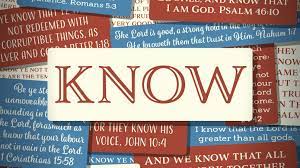Learning from our experiences
In last week’s teaching on “Lessons Learned in 2023”, I shared those things I will take with me as I moved forward into 2024. The “egg” I will carry includes spiritual growth, eternity, and finally, my knowledge of God. It is in this last area that I’d like to begin a new series, “The Knowledge of God”.
Knowledge of God has always been one of the foundational tenets that forms the framework for our teachings and programs that support our mission of “Transforming lives through teaching God’s Word.” The other tenets include knowing our identity in Christ (Gal. 2:20) and in remembering that our citizenship is in heaven (Phil. 3:20). We are part of the Kingdom of God.
Why is knowledge of God important?
Our knowledge of God…
-
- Establishes the moral authority and inspiration in our life. We look to God to provide us with truth needed to guide us in this fallen world. God gives us peace, joy, and hope needed during troubling and uncertain times. He is our strength and deliverance (Ps. 18:1-3).
-
- Results in purposeful living. We are God’s workmanship, created to do good works which He identified at the foundations of the world (Eph. 2:10). To live out the purpose God has for our life, it is critical that we are obedient to God’s directions. Living purposefully, the goal is spiritual maturity and ultimately, conformity to the image of Jesus Christ (Rom. 8:29).
-
- Enlightens us as to what God has given to us. As believers, we have everything we need to live godly in this world (2 Pet. 1:3). First and most importantly, we have eternal life. In addition, as children of God, we have access not only to Father God, but also to all the blessings and promises that go with this special relationship (Eph. 1:3-14).
All these things and much more are ours today. But it requires correct knowledge and understanding of who God is—His goodness and His greatness.
The journey begins.
The rise of humanism in our world, has caused man, incorrectly, to believe he is the most important and knowledgeable creature on the earth.
Humanism primarily focuses on human flourishing in the present world, emphasizing social progress, ethical living, and addressing immediate concerns. This may not automatically lead to a focus on knowledge of God unless individuals actively seek to connect those values with their spirituality.
In his groundbreaking work of faith, Your God is Too Small, J.B. Phillips encourages Christians to redefine their understanding of who God is. Phillips explains that the trouble facing many of us today is that we have not found God big enough for our modern needs.
Many women and men are living, often with inner dissatisfaction, without any faith in God at all. This is not because they are particularly wicked or selfish or, as the old fashioned would say, godless, but because they have not found with their adult minds a God big enough to account for life, big enough to fit in with the new scientific age, big enough to command their highest admiration and respect, and consequently they’re cooperation.[1]
We invite you to join us as we expand our knowledge of God. Let’s learn how God is “big enough” to meet us where we are today, even amid the complexities of 21st century living.
[1] Your God is Too Small, J. B. Phillips

